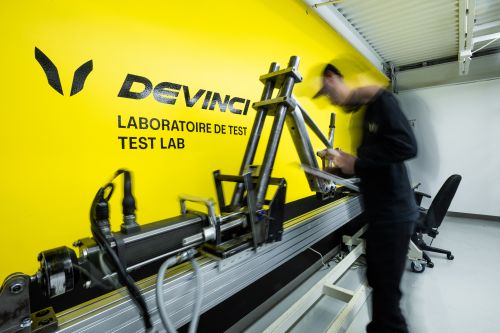Editor's note: A version of this story ran in the June issue of Bicycle Retailer & Industry News.
CHICOUTIMI, Québec (BRAIN) — Some two hours north of the city of Québec, along the Saguenay River, is the so-called “aluminum valley,” a region that produces around a third of Canada’s aluminum, thanks to ample hydroelectric power. And in the city of Chicoutimi, in the heart of the valley, is Cycles Devinci, a bike manufacturer that dates to 1987. Devinci sells bikes under its own brand and has manufactured 150,000 share bikes for programs globally, including Bixi share bikes. It also produces frames and bikes for several other brands and offers a heavy-duty commercial e-cargo bike.
While trade relations between Canada and the U.S. are currently in flux, Devinci’s owners said its factory offers North American brands an alternative to Asian production. Devinci has capacity to manufacture about 40,000 bikes a year, including welding and finishing aluminum frames, wheel building and two bike-assembly lines. The company’s location in the aluminum valley allows it to work closely with suppliers on manufacturing engineering and sourcing.
The company sources hydroformed aluminum frame parts from Asia and other regions as needed, and sells Devinici-branded carbon fiber models made overseas (assembled in Chicoutimi). But Devinci is most proud of its in-house capabilities, which include a research center that leverages local aluminum resources to refine its laser cutting, robotic welding, heat treatment, and other production practices, as well as research and development. The factory stocks components from Asia and elsewhere, allowing brands to make a “one-stop shop” with Devinci to order white label complete bikes.
“I think Devinci is one of the best-kept secrets in the North American bike industry,” Francis Morin, the company’s president and owner, told BRAIN in a recent interview.
Morin, a former pro mountain bike racer, is the son-in-law of Felix Gauthier, who bought the company (then called Da Vinci) in 1990 from its founders. Morin now owns the company with a handful of key investors.
Since before the COVID pandemic, Devinci has been investing in optimizing aluminum for mid- to high-end bike models — especially full suspension mountain bikes and e-bikes — as an alternative to carbon fiber. Aluminum offers a lower price and lower environmental cost, including the ability to be easily recycled.
Bauxite, the primary ore from which aluminum is extracted, is not mined in Québec. However refining bauxite into aluminum requires a massive amount of electricity, which the Saguenay River region provides through its hydroelectric plants.
Trade agreements are key
The United States-Mexico-Canada Agreement, ratified in 2020, replaced the North American Free Trade Agreement; President Trump, who signed the USMCA, once called it the “best agreement we’ve ever made.” More recently Trump has said Canada and Mexico have been “cheating” within the terms of the agreement and has threatened a 25% tariff on non-USMCA compliant goods, a 10% tariff on Canadian energy and potash and a 25% tariff on Canadian aluminum and steel.
But despite the noise, bikes and frames remain duty-free under USMCA, Morin said. (The aluminum tariff doesn’t apply to completed frames and bikes).
“I don’t know what Trump is going to do,” Morin said. “It could be beneficial in the end but we need to see North America work together.”
“My mindset is that both (aluminum and carbon fiber) can exist, for different price targets and volume,” Morin said. “But I am a strong believer that Canadian-made aluminum is very, very attractive in today’s market.”
While companies like Stinner (profiled in our April issue) offer OE production for high-end steel bikes in the U.S., Devinci is apparently the highest capacity North American manufacturer of mid-priced aluminum frames and bikes.
“It’s an interesting time for the bike industry. There are some challenges for sure, but also some great opportunities for collaboration, especially for sales in North America."


